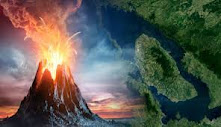Did a Supervolcano Eruption Force Ancient Humans to Leave Africa?
Imagine a world where the sky is obscured by clouds of ash, the temperature plummets, and the crops fail to harvest. This was the reality for early humans living in Africa about 74,000 years ago when the Toba supervolcano erupted.
The eruption of Toba was one of the largest volcanic events in Earth's history. It spewed so much ash into the atmosphere that it blocked the sun for several months, triggering a global climate crisis.
What is a supervolcano?
A supervolcano is a volcano that has the potential to erupt with a Volcanic Explosivity Index (VEI) of 8 or higher. VEI is a measure of the explosiveness of a volcanic eruption. A VEI 8 eruption is at least 100 times more powerful than the 1980 eruption of Mount St. Helens.
How many volcanoes are there in the world?
There are about 1,500 active volcanoes on Earth. However, only a small fraction of these volcanoes are considered supervolcanoes.
What do volcanologists say?
Volcanologists believe that the Toba eruption had a significant impact on the first human populations. The eruption may have caused a genetic bottleneck, reducing the diversity of the human gene pool. It may also have led to the extinction of some hominin species.
The eruption of the Toba supervolcano was a major event in human history. This had a significant impact on the early human population and may have even led to the extinction of some hominid species.
What do you think? Did the eruption of the Toba supervolcano force ancient people to leave Africa? Leave a comment below and share your thoughts.
Social media:
Share this blog post on social media and help spread the word!




Comments
Post a Comment